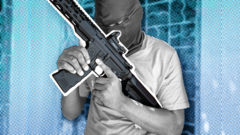Investigations reveal a disturbing trend of US firearms being trafficked to Haiti, fueling gang violence amid weak regulations and customs corruption. The chaos threatens millions and calls for urgent international action.
Unraveling the Arms Pipeline: US Firearms Flowing into Haiti's Gang Crisis

Unraveling the Arms Pipeline: US Firearms Flowing into Haiti's Gang Crisis
An exploration of how lax regulations and corruption facilitate the smuggling of US guns into gang-dominated Haiti, exacerbating violence and instability.
The arrival of US-made firearms in Haiti underscores a severe public safety crisis, illuminating a troubling cycle of arms trafficking that is exacerbating gang violence in the Caribbean nation. In a recent investigation by BBC World Service and BBC Verify, the journey of two boxes filled with weapons—containing 12 assault rifles and 14 handguns—was meticulously traced, revealing significant flaws in regulatory oversight that allow such shipments to slip through the cracks.
Originating from Fort Lauderdale, Florida, where lax laws permit private, unlicensed sales of firearms, the shipment made its way to Cap-Haitien aboard a cargo ship. The contraband was hidden among legitimate goods like food and clothing, a tactic that traffickers rely on to exploit weak enforcement mechanisms. As reported, Haitian police seized the boxes in April 2024, illustrating how easily these arms can reach a nation fraught with chaos and upheaval.
The investigation revealed that Haitian nationals in the US were behind the arms purchase, using "straw buyers" to circumvent regulations, a method that experts describe as all too common. In a nation where firearms are not manufactured domestically, past seizures show a strong link to acquisitions in the US, particularly Florida. Despite recent attempts by US President Joe Biden to tighten gun control, many shipments evade scrutiny—an issue exacerbated by the sheer volume of cargo traveling to Haiti weekly.
Further complicating the situation, Haitian customs operations have faced allegations of corruption and lack of capacity. A recent internal investigation implicated customs officials in the illicit importation of weapons, making it clear that the intersection of credible governance and arms regulation remains weak in the region.
The dire state of gang-related violence in Haiti has reached alarming proportions; the UN reported over 5,600 fatalities due to gang-related incidents last year alone. The leader of one of these gangs recently highlighted the ongoing struggle for power in Port-au-Prince, a condition marked by widespread chaos as rival factions contest control. Amid kidnappings, extortions, and widespread violence, residents bear the brunt of these conflicts, forced to flee their homes and seek refuge in public schools turned into makeshift shelters.
Experts assert that the link between US firearms and increasing violence in Haiti reflects a need for stricter regulations and a reevaluation of existing laws. While officials discuss potential solutions, including the implementation of a tracking system for gun ownership akin to vehicle registration, the challenge persists.
In light of this ongoing violence, the international community faces increasing scrutiny regarding their role in stemming arms trafficking to Haiti. Experts suggest that tackling this issue will require a concerted effort from both US authorities and global watchdogs to establish better oversight mechanisms that can effectively address the complexities of arms trafficking and its devastating impact on Haiti’s societal structure.






















